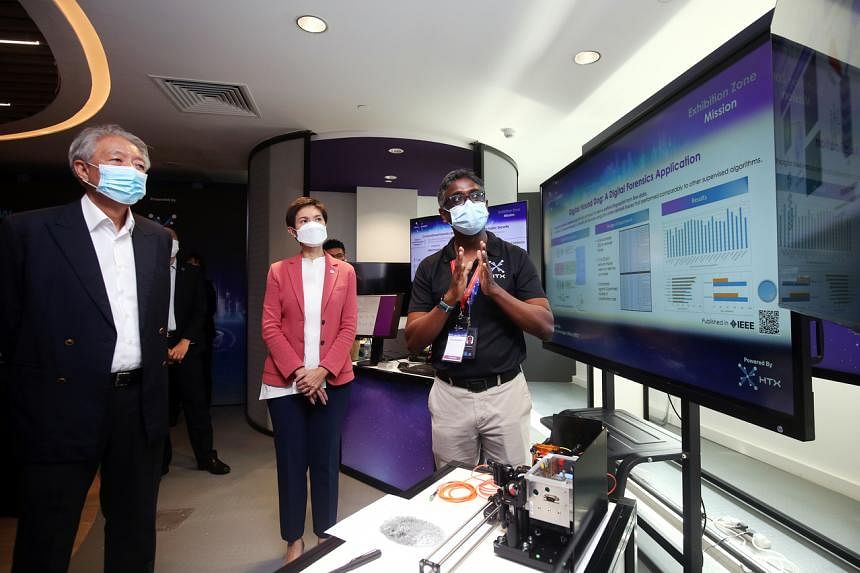SINGAPORE - Singapore's laws need to evolve with the changing circumstances so that the Republic can deal with new borderless threats to society enabled by technology, said Senior Minister Teo Chee Hean on Tuesday (April 5).
These threats include fake news and operations by foreign parties to influence people here. Increasingly sophisticated cybercrimes also pose a danger, such as crooks using ransomware to make patient records in Ireland and New Zealand inaccessible last May and causing some health services to be suspended.
"We need our policies, doctrines, laws and techniques to be alive to and aligned with the new dangers," said Mr Teo, who is also Coordinating Minister for National Security.
Internationally, new global rules, frameworks and standards will also be needed to fight the new threats, he said at the launch of the Home Team Science and Technology Agency's (HTX) inaugural TechX Summit at The Theatre at Mediacorp in Buona Vista.
Having legal tools, and not just technological ones, is one way Home Team agencies can stay ahead of criminals who are exploiting technology, added Mr Teo.
It was announced during the debate on the Ministry of Home Affairs' (MHA) budget last month that the ministry is working with other government bodies to develop a framework that will help the Government to tackle scams and a broader suite of criminal activity online, such as child pornography, terrorism and content inciting violence in Singapore's communities.
The Ministry of Communications and Information (MCI) is working with MHA to strengthen Singapore's laws against such issues.
MCI is also developing new codes of practice, which will have the force of law, that aim to raise the standard of online safety here.
They will focus on child safety, user reporting and platform accountability. The codes will also tackle the issue of online platforms used for criminal activities, such as a gunman live-streaming a mass shooting, and rioters using social media to organise themselves and spread their messages.
MCI's new codes are in line with new laws enacted in recent years in Germany, Australia and Britain to tackle the growing prevalence of online harm.
This is amid predictions that cybercrime will grow globally. Last year, cybercrime led to an estimated US$6 trillion (S$8.13 trillion) in damage globally, and in 2025, the amount is expected to increase to US$10.5 trillion, said Mr Teo.
But he added that technology is available to both sides of justice, noting that it can help homeland security and law enforcement agencies.
At the TechX Summit, HTX, an MHA agency, showcased various new technologies that it is studying, developing and testing to help Home Team officers in solving crimes, saving lives, improving public safety and security, securing borders, and safeguarding data and systems.
They include an unmanned surface vessel that aims to support the Police Coast Guard's maritime patrolling work to keep the country's waters safe.
The sea vessel is undergoing technical trials to test, among other things, that it can navigate Singapore's congested and narrow water channels by itself without a human operator, while being able to detect and avoid collisions.

HTX is also developing an in-house system that could, in future, help checkpoint officers quickly screen and identify travellers who might have malicious intent from among the many that pass through immigration here.
This is done by using visual sensors, like high-resolution cameras and thermal sensors, to detect signs of nervousness in a traveller - both visual and physiological - that could be linked to suspicious behaviour. Follow-up security checks are then done by officers on travellers that the system has flagged.
With 995 calls rising over the years, HTX, Nanyang Technological University and the Singapore Civil Defence Force have developed a speech-to-text tool that could help Home Team officers transcribe such emergency calls in English, Malay and Chinese by using artificial intelligence.
With the tool taking care of note-taking, an officer could focus on listening to the call and the follow-up actions that need to be taken.
The tool has a transcription accuracy of close to 80 per cent for English and is being trialled now. There are plans to extend this to 999 calls and the tool could include Tamil transcriptions in future.
Mr Teo said that even as technology has given the Home Team new capabilities to combat physical and cyber crime, "it is not an unalloyed good".
For instance, surveillance cameras and facial recognition technology can be used to keep the public safe by helping Home Team officers to solve and deter crimes. But Mr Teo said such technology raises privacy concerns.
"We need to establish proper guidelines and standards on the use of technology to provide ample protection, and to preserve trust and confidence," he said.
"Only with these in place can we make the best use of what technology can offer us, to improve our capability to protect our societies and people from the new dangers."
Asked about the AI tools it is developing and testing, HTX said that MHA's AI Governance Framework guides its officers to identify and evaluate the risks linked with using AI. The framework seeks to ensure that MHA uses AI in a legal and transparent way that promotes public trust.
Some of the framework's considerations include having data protection measures in place to prevent leaks of personal information, as well as using accurate and complete data that is representative of different groups of people to prevent bias against any particular group.
To further cut the risk of bias in using AI, high-risk areas will need human officers to have oversight in making decisions, among other measures.
For the speech-to-text tool, HTX removed all personally identifiable information when developing it. The agency also sought to ensure that the data used to train the tool's AI is representative.


